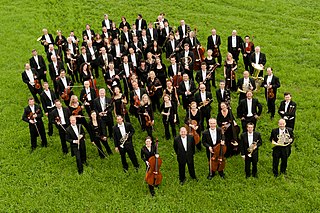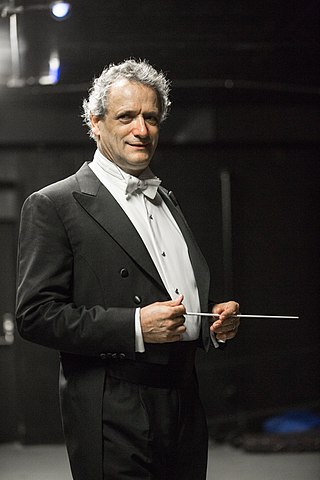Related Research Articles

Sir Roger Arthur Carver Norrington is an English conductor. He is known for historically informed performances of Baroque, Classical and Romantic music.
Sándor Végh was a Hungarian, later French, violinist and conductor. He was best known as one of the great chamber music violinists of the twentieth century.

Leonidas Kavakos is a Greek violinist and conductor. He has won several international violin competition prizes, including the Sibelius, Paganini, Naumburg, and Indianapolis competitions. He is an Onassis Foundation scholar. He has also recorded for record labels such as Sony/BMG and BIS. As a conductor, he was an artistic director of the Camerata Salzburg and has been a guest conductor of the London Symphony Orchestra and Boston Symphony Orchestra.

The Mozarteum Orchestra Salzburg is an Austrian orchestra, based in the town and state of Salzburg. The orchestra gives concerts in several Salzburg venues, including the Großes Festspielhaus, the Great Hall of the Stiftung Mozarteum. In addition to symphony orchestra concerts, the orchestra serves as accompanying ensemble for operas and musical theatre performances at the Salzburg State Theater.
The Orchestra of St. Luke's (OSL) is an American chamber orchestra based in New York City, formed in 1974. The orchestra performs at several venues in New York City, including, Carnegie Hall, Caramoor Center for Music and the Arts, Saint Thomas Church (Manhattan), Congregation Emanu-El of New York, and Merkin Concert Hall.
The Mozart Medal is an award administered by the Mozarteum International Foundation. It derives its name from Wolfgang Amadeus Mozart. The medal is available in three metal types: gold, silver, bronze.
Belgrade Music Festival (BEMUS) is a Serbian music festival. Founded in 1969, it is the oldest and the most prominent music festival in Serbia and one of the most distinctive classical music festivals in the South-Eastern Europe. Enjoying the position of a cultural event of special importance for the City of Belgrade, BEMUS has been a member of the European Festivals Association (EFA) since 2002.

Louis Langrée is a French conductor. He is the son of organist and theorist Alain Langrée.
Alexander Mullenbach is a Luxembourg pianist, composer and conductor. Since 2002, he has been director of the International Summer Academy at the Mozarteum in Salzburg.

Roberto Michelucci was an Italian classical violinist.
Cyndia Sieden is an American coloratura soprano on the opera and concert stages.
Alexander Lonquich is a German classical pianist and conductor.

George Alfred Maran was an American opera, oratorio, and concert tenor. Born near Boston, Massachusetts. Maran attended Harvard University where he and his voice came to the attention of people such as Leonard Bernstein and Paul Hindemith. He first drew international attention when he won the “Mozart-Medaille”(Mozart Medal) from the Mozarteum International Foundation in Salzburg in 1956 on Mozart’s 200th birthday. The same year, and the next forty years thereafter, he was a soloist at the Opera in Darmstadt, Germany. Even so, he continued singing all over Europe and the United States, the world premiere of A Midsummer Night's Dream (opera) with Benjamin Britten conducting as a prime example. He has sung many wide-ranging and varied genres as soloist in opera, operetta, oratorio, and on the concert stage.

Bernhard Paumgartner was an Austrian conductor, composer and musicologist. He is most famous for being Herbert von Karajan's composition teacher at the Mozarteum in Salzburg, where he recognized his pupil's potential gifts for conducting. Karajan would become a notable conductor. He also taught Vittorio Negri.
Roberto González-Monjas is a Spanish classical violinist and conductor.
Cornelia Herrmann is an Austrian pianist.

The Mozarteum International Summer Academy goes back to its beginnings in the summer of 1916 and has borne its current name since 1947. Today, more than 80 masterclasses are held annually. These are run by teachers of the Mozarteum University Salzburg and selected, internationally renowned artists and are attended by 800–1000 young musicians from all over the world.
David Danzmayr is an Austrian conductor.
"Voi avete un cor fedele", K. 217, is a concert aria by Wolfgang Amadeus Mozart for solo soprano and orchestra, composed in Salzburg, dated 26 October 1775. Written around the time of the composition of Mozart's five violin concertos. In this aria, the character Dorina contemplates a new romantic partner.
The Mozart Week is a classical music festival centred on Wolfgang Amadeus Mozart, held every year in his native Salzburg. It was created in 1956 on the 200th anniversary of his birth, and coincides with his birthday 27 January, lasting in fact slightly over a week.
References
- ↑ Andrew Clements (23 August 2002). "Prom 43: Camerata Salzburg/Norrington". The Guardian. Archived from the original on 9 September 2014. Retrieved 9 July 2011.
- ↑ Ivan Hewett (5 June 2008). "Leonidas Kavakos: 'Music is about devotion, and knowing when to be free'". Telegraph. Archived from the original on 5 February 2012. Retrieved 9 July 2011.
- ↑ "Leonidas Kavakos announces his resignation as Artistic Director of the Camerata Salzburg" (Press release). Intermusica. 1 July 2009. Archived from the original on 28 September 2011. Retrieved 9 July 2011.
- ↑ "Louis Langrée neuer Chefdirigent der Camerata Salzburg" (Press release). Camerata Salzburg. 11 June 2011. Archived from the original on 20 August 2011. Retrieved 9 July 2011.
- ↑ Anthony Holden (3 April 2005). "Spirit-raisers". The Observer. Archived from the original on 18 September 2014. Retrieved 9 July 2011.
- ↑ Tim Ashley (9 January 2009). "Mozart: Works for Oboe and Orchestra; Leleux/Camerata Salzburg". The Guardian. Archived from the original on 6 December 2015. Retrieved 9 July 2011.
- ↑ Andrew Clements (7 August 2009). "Mendelssohn: Violin Concerto in E minor; Piano Trios Opp 49 & 66". The Guardian. Archived from the original on 12 March 2016. Retrieved 9 July 2011.
- ↑ "1999 — München am 12. September 1999". Europäische Kulturstiftung Pro Europa (in German). Archived from the original on 26 September 2023. Retrieved 26 September 2023.